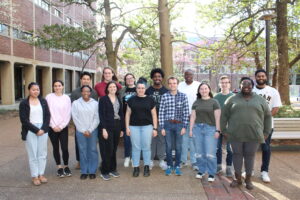
The Walker lab uses machine learning and statistics to solve difficult problems in chemical biology. Since machine learning works best on large datasets, our focus is on problems with existing large datasets or easily generated datasets, allowing us to take advantage of the wealth of genomic and metagenomic sequences. Additionally, we explore data generated from molecular dynamics simulations along with next-generation sequencing of directed evolution experiments.
After a machine learning model is developed, we experimentally verify our computational predictions and use experimental data to further optimize our models. Students in the Walker lab can choose a balance between computational and experimental work best suited to their experience and interests.
One area of focus is developing machine learning tools to facilitate engineering and discovery of natural products. Natural products are an excellent source of bioactive molecules that can be used as therapeutics. Our current research is focused on:
1) Developing algorithms that predict natural product activity from the biosynthetic gene clusters that produce them
2) Using machine learning to investigate regulation of natural product production
3) Developing tools to guide the engineering of biosynthetic gene clusters to produce novel natural product-like molecules
4) Developing machine learning tools to design natural product-like inhibitors of protein-protein interactions